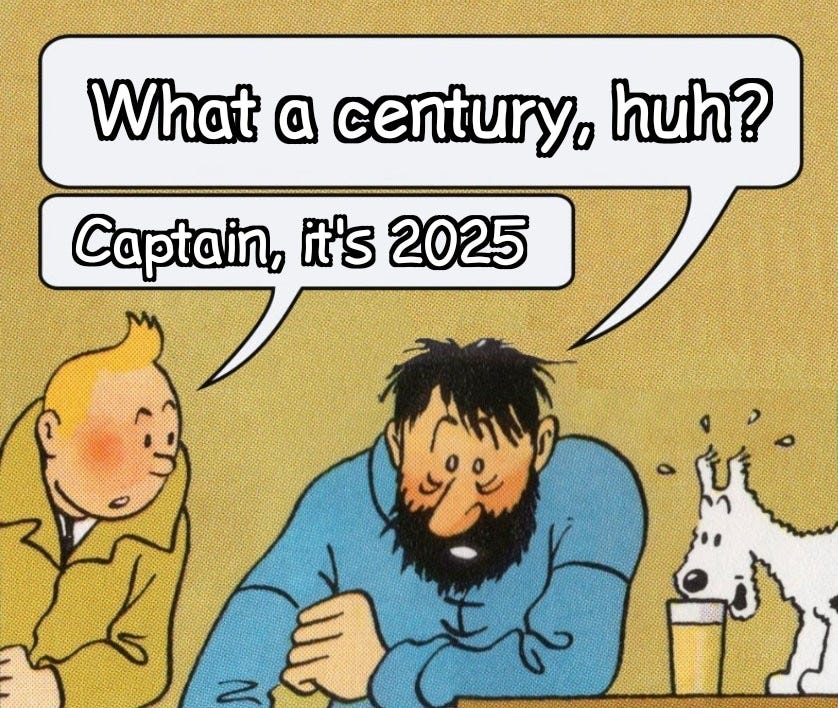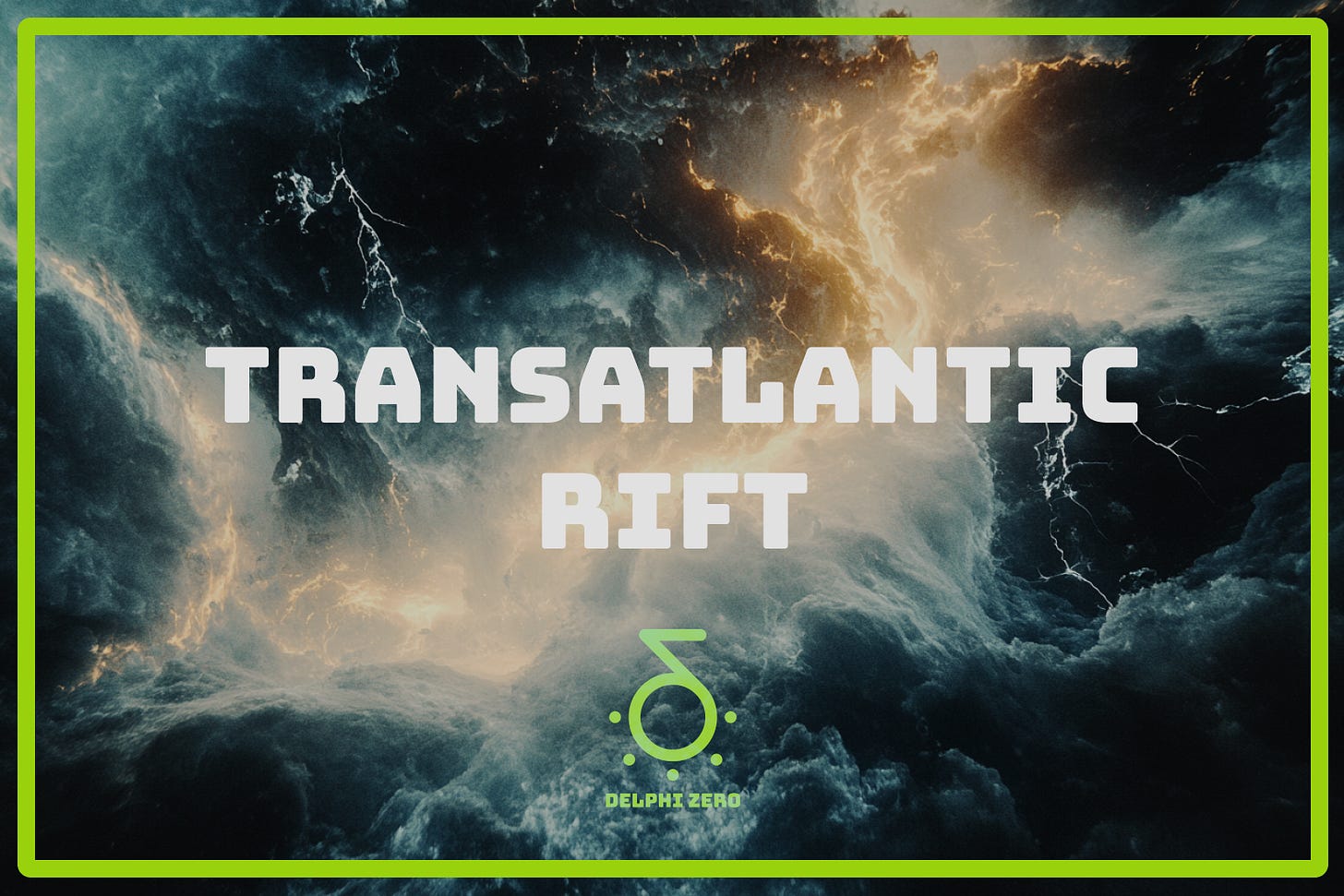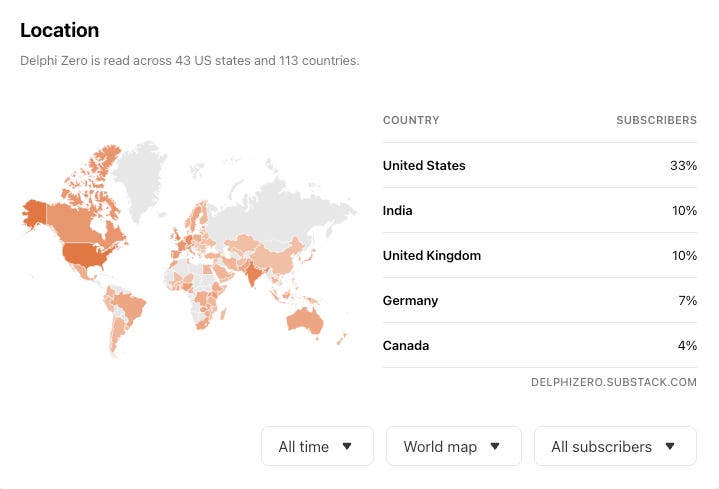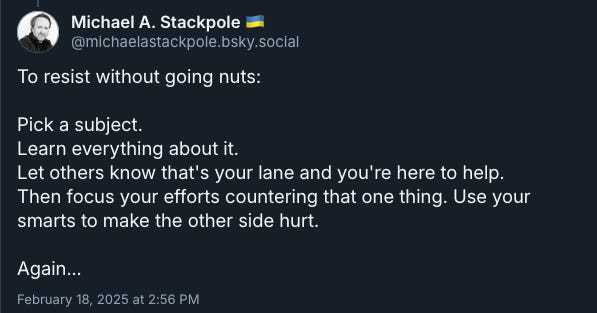Transatlantic Rift
What You Can Do In Times of Crisis
👋 Hi to 3,030 climate buddies 🌳
Delphi Zero explores the interplay of climate, energy, and security 🌳🔋🛡️
📧 If you are opening this essay in your email inbox, I recommend to click on the title of this piece to enjoy the full-length version in the browser.
Well, shit! This is that it feels like to live through historic times.
The US-EU partnership is breaking apart in front of our eyes. I don’t like it a single bit and that’s why today’s essay will cover:
What I’m observing
Why I’m choosing to act pro-actively
How I plan to do it (+ how you can do the same)
tl;dr: What to do in times of crisis 💥

Transatlantic Rift
By Art Lapinsch
This is not the essay I wanted to write. But it’s the one I have to write.
Yes, Delphi Zero is a climate-focused publication. But more importantly, it’s an honest reflection of what’s going on in my head (and in my heart). My motivation to starting this publication was this:
Russia’s invasion of Ukraine changed everything for me.
I have family history in that region, many of our Ukrainian friends were affected, and once upon a time my parents and I were war refugees ourselves.
On top, as a German tax payer, it became clearer by the day that security policy and energy policy are heavily intertwined. For better or for worse.
I started doom scrolling and one topic lead to the next: Security updates from the conflict zone → security policy analyses → energy policy analyses → climate technology.
I got hooked by the intersection of Energy 🔋 x Climate 🌳 x Security 🛡️ and my curiosity just ran with it.
Initially, it was just another rabbit hole but soon enough I realized that the climate space was full of opportunity. Finally, I convinced myself to spend the next chapter of my career in climate.
Even if I haven’t published much security-related content in recent months, it’s still very much at the core of Delphi Zero.
I hope that today’s essay will expand your view of the world we live in today.
What the Hell Is Going On?
It’s 2025 and the current US administration is dismantling transatlantic relations faster than we can report on it.
Here’s a quick lowlight reel:
After claiming that Europe is in democratic decline, JD Vance (Vice President of the US) refused to meet with sitting German Chancellor Olaf Scholz and instead met with the leader of the far-right party AfD. [A side note: A German court has ordered the surveillance of the AfD party because they are deemed to be a threat to democracy.] Well done, JD. Actions speak louder than words.
In a recent U.N. vote - condemning Russia’s aggression towards Ukraine - the US delegation sided with Russia.
The US met with the Russian delegation to hold “peace talks.” Who was not present at the table? Ukraine.
That’s not a good picture.
What’s New About This Situation?
In 1949, NATO was co-founded by the US with the following objective:
The North Atlantic Treaty Organization was created in 1949 by the United States, Canada, and several Western European nations to provide collective security against the Soviet Union.
The US guaranteed safety for the European continent. This seems to be eroding more and more each day.
In the past, Europe and the US might have had disagreements on policy matters. But they could always count on one thing: They both shared democratic values.
This doesn’t seem to be the case anymore.
Frank Sauer (Senior Research Fellow at the Bundeswehr University in Munich) once divided possible conflict lines along four parameters:
🗺️ Territory: Landlines; etc.
☝️ Cultural: Anti-modern vs. Progressive
🛢️ Energy: Fossil vs. Renewable
⚖️ Political: Autocratic vs. Democratic
While the US government starts looking less like a liberal democracy and more like an authoritarian regime, the political conflict lines are being reshuffled.

This is a massive problem for Europeans because Russia is the #1 military threat for the continent.
Why Do I Care?
In 1992, my parents and I fled the Yugoslav Civil War when it reached Bosnia.
To this day, us getting out of there is the single-most-impactful event in my life.
I am where I am because of it.
I am who I am because of it.
Now, with an increased likelihood of the US abandoning Europe as a security guarantor, this means that armed conflict might be at our doorstep (yet again).
Analysts say that IF an armed conflict happens THEN it is likely to start in one of the Baltic countries (Lithuania; Latvia; Estonia). Here’s a 3-minute explainer video that captures the various risks pretty well.
Why? Because geography dictates so 👇

Let me break down my color-coded annotations:
🇷🇺 Russia (Red): Some people are surprised to learn that Russia’s territory is split into two parts: (1) the massive area that all of us know from global maps, but (2) also a small plot of land (i.e. Kaliningrad Oblast) that’s wedged right in between Poland and Lithuania.
🇧🇾 Belarus (Orange): Belarus is a quasi-Vassal state. The dictatorial regime in Minsk works in tandem with Moscow. Whether it means hosting Russian troops on its territory (as done right before the full-scale invasion into Ukraine) or by other means.
🔧 Choke Points (Blue): These are areas, which restrict transportation via land. Now look at what’s going on from the perspective of the Baltic States: West, you have the Baltic Sea; North, you have the Gulf of Finland; East, you have Russia; South, you have Belarus and a 50km stretch from Russian to Belarusian territory. It would be relatively easy to cut of land-routes to the Baltics.
The Baltics include 3 countries, roughly 6 million people, and my father’s side of the family. These guys 👇
Rough Awakening for Europe
What does this mean for Europe?
Donald Tusk (Prime Minister of Poland) said it well:
Hear for yourself how it sounds,
500 million Europeans begging 300 million Americans to defend them from 140 million Russians.
If you can count, count on yourself. Not in isolation, but with full awareness of your potential.
Today, in Europe, we do not lack economic strength, people, but the belief that we are a global power.
Welcome to 2025. Time to wake up.
What Are The Baltics Doing?
Since this is an energy-related publication, I want to focus on a specific action besides all the military-related activities: Grid Connection.
Since (a) energy can be used as an offensive capability in a conflict and (b) Baltic countries partially depended on electricity from the Russian grid, it was time for the Baltics to get serious about energy security.
This meant that Lithuania, Latvia, and Estonia decided to (1) not renew their partnership agreement with Russia, (2) cut the electricity grid connections from the Russian Grid, and (3) connect to the Continental Europe Synchronous Area (CESA).
Let’s have a look at a map showing what’s going on 👇

🔌 Interconnectors (Red): The Baltics have disconnected from the 9 Russian interconnectors (i.e. cables with massive electricity flow capacity between different electricity markets/grids).
🏝️ Energy Island (Yellow): Kaliningrad Oblast has become a de-facto energy island and now depends exclusively on it’s own energy production via gas and coal power plants.
The press release of entso-e says the following:
Estonia, Latvia, and Lithuania have successfully synchronized their electricity grids with the Continental Europe Synchronous Area (CESA) on 09 February 2025 at 14:05 EET, marking a historic milestone in their journey towards strengthened energy system resilience and integration with the Continental Europe electricity grid.
… This process follows years of thorough preparation and cooperation among the Baltic transmission system operators (TSOs): Elering (Estonia), Augstsprieguma tīkls (AST, Latvia), Litgrid (Lithuania), and their counterparts in the Continental Europe synchronous area. A particularly important role of PSE in Poland was the overall coordination and project management, as a direct neighbour and as the system which physically connects the Baltic States’ systems to Continental Europe.
This is only one of many measures to build and expand their own resilience. Watch this region of the world.
What Am I Doing?
This is a very scary moment but I want to be doing something.
It’s just a starting point and I hope to expand these activities over the coming months. If you have better ideas, please let me know.
#1: Spread Useful & Factual Information
Looking at my audience, the largest chunk of people is in the US. That’s great!
My wife is American and I have my in-laws and many many close friends living in the States. This country is dear to my heart and I want to keep this line of communication going.
Hopefully some of my info can inform you - American readers - about what’s going on in Europe.
#2: Fight Disinformation
One of the most actionable pieces of advice I’ve seen is the following 👇
Honestly, if you don’t know what else to do in the current environment, just pick a lane/subject and get active.
I’ll fight disinformation in my areas of expertise: Comms; climate; energy; etc.
#3: Boost the EU
If you run an EU-focused organization and think that I can help, get in touch with me 🇪🇺
I’m here to help.
What You Can Do In Times of Crisis
Up is down and down is up.
In times like these, the important thing is to regain some sort of control. Start acting on what you can control for the sake of your own sanity and to build momentum.
Small steps accumulate over time. Get started.
Important Side Note: Our world is full of issues and problems.
There are many conflicts going on. Gaza, Sudan, Sahel, and unfortunately many more. There are climate/nature topics. There are cultural and societal topics. All of them are important.
But we have a limited bandwidth of what we can deal with physically, intellectually, and emotionally.
Your topic might not be European security. I understand.
The only thing I can tell you. If you find a topic that you truly care about, maybe lean in and try to do something about it. Every little helps. I hope you succeed.
What To Expect In the Coming Weeks?
I have a whole backlog of climate-related topics:
An exciting series of posts about Antarctica 🇦🇶
More expert interviews across the entire spectrum from energy tech founders to activists 🎙️
But, given the times, I will write more essays related to the active conflict zones we see today:
A practical series about the fundamentals of EU law 🇪🇺
More security-related analyses 🛡️
I will do my best to ignite the European Optimism Machine.
Time to wake up. Time to step up. Let’s do this.
🙏 Thanks to my cousin Harijs for highlighting the grid disconnection topic.
And thanks everyone for reading. Please get in touch.







that’s a great piece, Art!
What a beautiful piece. Looking forward to the next ones!